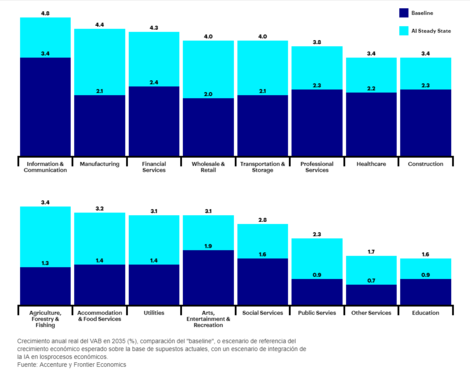21/02/2018
It is a key piece in the economies of the future. The companies that bet on it will increase their profitability by 38% and it is estimated that its economic impact could mean 14 billion dollars in GVA* (gross value added) in 2035, but which are the sectors that will most notice the benefits of Artificial intelligence? Which ones does it impact directly and will it change the way you work forever?
An Accenture report reveals what these sectors are and analyzes how to get the most out of these new technologies, which are not really that new, nor are they a thing of the future. Some 30% of workers already use smart technology for more than half of their time and 72% of Spanish workers believe that AI will have a positive impact on the work environment, ten points above the global average.
However, which sectors are particularly affected? The study reveals that information and communication, manufacturing and financial services will benefit the most. The sectors where it will generate the least economic growth will be education, public services and social services.
To reach these conclusions, the study compares two scenarios for each sector. First, the baseline or reference scenario shows the expected economic growth in the sectors based on current assumptions. Secondly, the stable situation of AI shows the expected growth with its integration into economic processes. Since it takes time for the impact of a new technology to take root, it uses 2035 as the year of comparison.
For its part, the financial services sector can use AI technologies to relieve knowledge workers of routine and repetitive tasks, such as generic customer queries, mortgage reviews and market research. Overall, this sector will benefit from $1.2 trillion in additional GVA in 2035.
In fact, the study reveals that even the sectors least likely to benefit from the implementation of Artificial Intelligence will experience significant increases in GVA growth rates. Education will see an increase from 0.9% to 1.6% in 2035 and social services from 1.6% to 2.8%, which will generate substantial increases in economic output.
How does artificial intelligence generate value?
Thanks to new technologies, workers can delegate low-value tasks to AI and be more productive in their core tasks. This generates an enrichment of capital and labor .
Second, AI offers enormous advantages over traditional automation, either by streamlining the production chain, facilitating supply chain management or simplifying the sales process. This is called intelligent automation.
Finally, by accelerating new product development, AI helps to boost innovation, eliminate redundant costs and generate new revenue streams to increase profitability.
The truth is that the forecasts are optimistic. Sixty-three percent of senior executives worldwide think that artificial intelligence will create new jobs in the next three years, a figure that rises to 67% in the case of Spain. It won’t be easy, of course. The key, experts conclude, is to empower people and evolve your business. The time of Artificial Intelligence is getting closer every day.
* GVA is a production indicator that expresses the value of goods and services produced in a given sector. It could be understood as the contribution of different sectors to economic growth.











